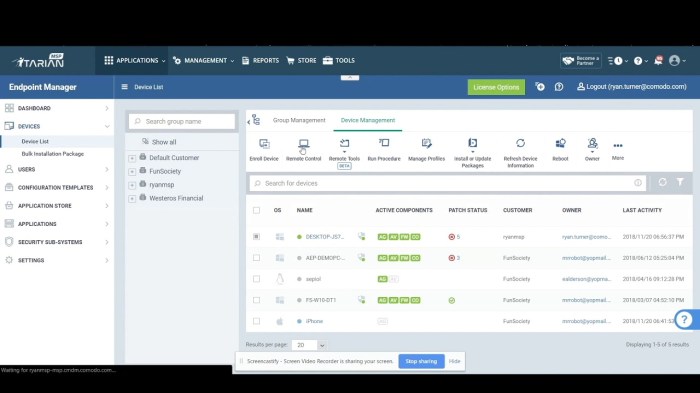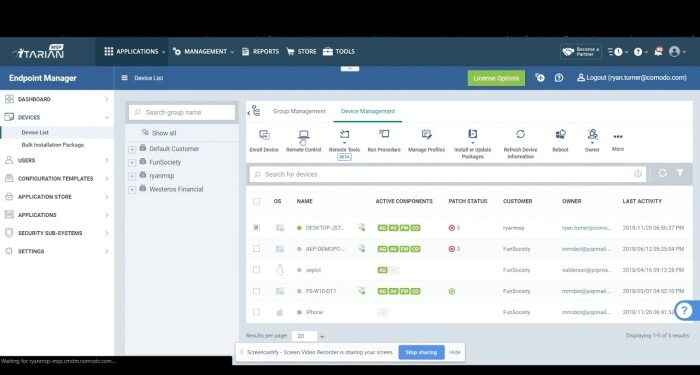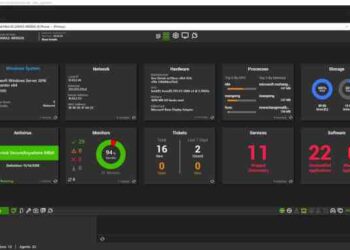Top remote monitoring software for IT management sets the stage for this enthralling narrative, offering readers a glimpse into a story that is rich in detail with casual formal language style and brimming with originality from the outset.
As businesses increasingly rely on IT infrastructure, the need for robust remote monitoring software becomes paramount. This article delves into the key features, implementation strategies, and security aspects of top remote monitoring tools, providing a comprehensive guide for IT professionals.
Overview of Remote Monitoring Software
Remote monitoring software plays a crucial role in IT management by allowing organizations to oversee their network and systems remotely. This technology enables IT teams to monitor various aspects of their infrastructure in real-time, ensuring optimal performance, security, and compliance.
Key Features of Top Remote Monitoring Software
- Real-time Monitoring: Top remote monitoring software should provide real-time insights into the status of network devices, servers, applications, and more.
- Alerting and Notification: The software should have customizable alerts and notifications to immediately inform IT teams of any issues or potential threats.
- Performance Metrics: It should offer detailed performance metrics and historical data to help identify trends and optimize IT operations.
- Security Monitoring: Remote monitoring software should include security monitoring features to detect and respond to security breaches or unauthorized access.
- Automation and Remediation: Automation capabilities can help IT teams automate routine tasks and remediate issues quickly to minimize downtime.
Enhanced Efficiency and Security with Remote Monitoring Software
Remote monitoring software enhances IT efficiency by streamlining monitoring processes, reducing manual tasks, and improving response times to incidents. By providing real-time insights and alerts, IT teams can proactively address issues before they escalate, ensuring smooth operations and optimal performance.
Additionally, the security monitoring features of remote monitoring software help organizations strengthen their cybersecurity posture by detecting and mitigating potential threats in a timely manner.
Top Features to Look for in Remote Monitoring Software

When selecting remote monitoring software for IT management, it is crucial to consider the key features that will help streamline operations, enhance security, and improve overall efficiency. Here are some essential features to look for:
Real-Time Monitoring
Real-time monitoring is a critical feature that allows IT teams to stay updated on the status of their network, systems, and applications in real time. This feature provides instant visibility into any issues, performance bottlenecks, or security threats, enabling prompt action to be taken to address them.
Alerts and Notifications
Effective remote monitoring software should have robust alerting capabilities that notify IT teams of any anomalies, failures, or potential risks within the infrastructure. Alerts and notifications can be customized based on specific thresholds or conditions, ensuring that critical issues are addressed promptly.
Reporting and Analytics
Comprehensive reporting and analytics tools are essential for tracking performance metrics, analyzing trends, and generating insights to optimize IT operations. Remote monitoring software with advanced reporting capabilities can help IT teams make data-driven decisions, identify areas for improvement, and demonstrate compliance with regulatory requirements.
Automation and Remediation
Automation plays a crucial role in remote monitoring tools by enabling predefined actions to be taken automatically in response to certain events or alerts. Automated remediation tasks can help resolve issues quickly, reduce manual intervention, and minimize downtime, ultimately improving the overall efficiency of IT management.Overall, the top features to look for in remote monitoring software include real-time monitoring, alerts and notifications, reporting and analytics, as well as automation and remediation capabilities.
By selecting a software solution that offers these key features, IT teams can effectively monitor, manage, and secure their IT infrastructure with greater ease and efficiency.
Implementation and Integration
Implementing and integrating remote monitoring software into an organization's IT infrastructure is a crucial process that requires careful planning and execution. Here is a step-by-step guide on how to successfully implement remote monitoring software and ensure seamless integration with existing systems.
Step-by-Step Guide for Implementation
- Assess Your Needs: Identify the key areas in your IT infrastructure that require monitoring and determine the specific requirements for remote monitoring software.
- Research and Select a Suitable Solution: Evaluate different remote monitoring software options based on features, scalability, compatibility, and cost.
- Plan the Deployment: Develop a detailed deployment plan outlining timelines, responsibilities, and resources needed for implementation.
- Install and Configure the Software: Follow the vendor's instructions to install the remote monitoring software and configure it according to your organization's requirements.
- Test the System: Conduct thorough testing to ensure that the software is functioning correctly and monitoring the desired aspects of your IT infrastructure.
- Train Users: Provide training to IT staff and relevant stakeholders on how to use the remote monitoring software effectively.
- Monitor and Optimize: Continuously monitor the performance of the software and make necessary adjustments to optimize its functionality.
Importance of Seamless Integration
Seamless integration of remote monitoring software with existing IT infrastructure is vital for maximizing its effectiveness and minimizing disruptions. Integration ensures that the software can access the necessary data and systems to monitor and manage IT resources effectively.
Challenges and Best Practices for Integration
- Compatibility Issues: Address compatibility issues between the remote monitoring software and existing systems by ensuring that the software supports the required protocols and standards.
- Data Security: Implement robust security measures to protect sensitive data transmitted and accessed by the remote monitoring software.
- Scalability: Consider the scalability of the software to accommodate future growth and changes in your IT environment.
- Collaboration with IT Teams: Foster collaboration between IT teams responsible for implementing and maintaining the remote monitoring software to ensure smooth integration.
- Regular Monitoring and Updates: Continuously monitor the integration process and update the software as needed to address any issues or changes in the IT infrastructure.
Security and Compliance
When it comes to IT management, security and compliance are crucial aspects that cannot be overlooked. Remote monitoring software plays a vital role in ensuring cybersecurity and adhering to compliance requirements.
Role of Remote Monitoring Software
Remote monitoring software acts as a proactive defense mechanism against potential security threats by continuously monitoring IT systems in real-time. It helps in identifying vulnerabilities, suspicious activities, and unauthorized access attempts.
Common Security Threats
- Malware and ransomware attacks
- Phishing and social engineering
- Insider threats
- Data breaches and leaks
Mitigation with Remote Monitoring Tools
Top remote monitoring software solutions offer features such as:
- Real-time alerts for unusual activities
- Network traffic monitoring to detect anomalies
- Endpoint security to prevent unauthorized access
- Security incident response capabilities
Addressing Security and Compliance Requirements
Leading remote monitoring software providers ensure compliance with industry standards and regulations by:
- Encrypting data transmissions to protect sensitive information
- Providing audit trails and logs for regulatory purposes
- Implementing role-based access controls to restrict unauthorized users
- Conducting regular security assessments and updates
Wrap-Up
In conclusion, top remote monitoring software for IT management serves as a linchpin in ensuring the smooth operation and security of IT systems. By leveraging the right tools and features, businesses can streamline their operations and proactively address potential challenges in the digital landscape.
Common Queries
What key features should top remote monitoring software have?
Top remote monitoring software should ideally offer real-time monitoring, customizable alerts, detailed reporting, scalability, and seamless integration capabilities.
How can remote monitoring software enhance IT efficiency and security?
By providing proactive monitoring, quick incident response, and automated tasks, remote monitoring software boosts IT efficiency. It also enhances security by detecting vulnerabilities, preventing potential threats, and ensuring compliance with regulations.
What are the common security threats that remote monitoring tools can mitigate?
Remote monitoring tools can help mitigate threats like unauthorized access, malware infections, data breaches, and DDoS attacks by detecting anomalies, monitoring network traffic, and implementing security protocols.




![Top 10 RMM Solutions [2024] | NinjaOne](https://ecommerce.mardinata.com/wp-content/uploads/2025/10/Best-RMM-Software-and-Tools-1-120x86.jpg)






